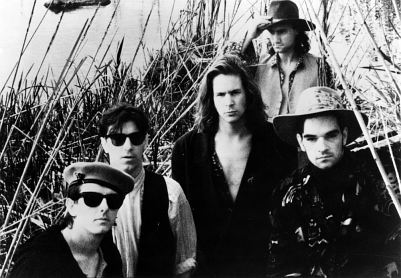by Steve Dougherty (and Vicki Sheff in Los Angeles) - from US People magazine, 1988
 A band led by a passionate, handsome, long-haired singer and a hat-happy guitar
player is about to perform a traffic-jamming set on a Dublin street for
thousands of delirious fans.
A band led by a passionate, handsome, long-haired singer and a hat-happy guitar
player is about to perform a traffic-jamming set on a Dublin street for
thousands of delirious fans.
"They're different," observes an enthusiastic young female admirer. "They're fantastic, they dress well and they're all gorgeous." Adds another fan: "They're brilliant. They're original, they're great musicians - and they're Irish."
U2 may think you know the name of the band in question, but UR probably wrong. This latest group of sod rockers are known as Hothouse Flowers, and thanks to the steamy stage presence and soulful voice of lead looker and flower child Liam O'Maonlai (say it Lee-am O'Mwanly), 24, the Flowers are doing blooming well, thank you. O'Maonlai, who also serves as the group's bluesy piano man and lyricist, teams with boyhood mate and guitarist Fiachna 0 Braon~ln (Fee-ak-nah 0 Bray-nine), 23; bass and bouzouki player Peter O'Toole (no relation), 23; drummer Jerry Fehily (Fayly), 25; and sax man Leo Barnes, 33. A group of Dublin street buskers just three years ago, the Flowers were named "hottest unsigned band in Europe" by Rolling Stone in 1986. But a single, "Love Don't Work This Way," released at the urging of U2's Bono on that group's own Mother label, hit big in Ireland last year and led to a contract with London/PolyGram. The Flowers' debut album, People, reached No 1 in Ireland and No 2 in England but has lagged in the U.S. despite good reviews and a personal endorsement from U2's Bono, who has called the Flowers "a masterpiece of a band."
Nurtured in Dublin, the Flowers are part of a music explosion, responsible for the export of U2, Sinead O'Connor and the Waterboys, which has been dubbed "Liffeybeat" (a la Merseybeat) for the city's Liffey river. The group blends Celtic folk and American R&B sounds to create a rocking brand of Irish soul music. Critics have heard everyone from Joe Cocker to Bruce Springsteen, Michael Hutchence and Ray Charles in O' Maonlai's vocals. For his part, O'Maonlai isn't quite sure what to call the Flowers' sound. "I wouldn't say it's rock," he says. "It's more roll - hard roll."
Born in Dublin to a civil engineer and an actress, O'Maonlai spoke Gaelic as a child, and still uses the ancient Irish language in conversation with O'Braonain. The pair met at Scoil Lorcain, a Gaelic-language grade school where O'Maonlai learned to play the Irish tin whistle and bodhran, a goat skin drum. "I always knew, even as a young child, that I wanted to play music and I would be successful doing it," says O'Maonlai. "It wasn't something I dreamed of or wished for. It was almost something I knew as fact." O'Braonain, whose father was set to be a priest until he met and married a book editor, learned to play the tin whistle at 7 and at 12 began to "abuse my mother's guitar by playing 12-bar blues."
Having formed their first electric rock band at 17, O'Braonain and O'Maonlai quit college in 1985 to become, improbably, the Incomparable Benzini Brothers. The alleyway ensemble was joined occasionally by local winos and O'Toole, a Dubliner who grew up next door to a monastery and learned guitar from a monk. After the group won a Street Entertainers of the Year competition in Dublin, Barnes, a classically trained musician who grew up in an orphanage, and Fehily, who cleaned toilets as a teen to pay for his drums, joined the band. Before success struck, the Benzinis changed their name - O'Maonlai took the new one from a '30s jazz song title. Hothouse Flowers are "tender and defenseless," says the quasi hippie, a vegetarian who wears musk and work shirts. "The name is like us, sensitive beings."
O'Maonlai's embrace of '60s values stops short of free love. "To stop temptation, I don't drink very much on the road," he says. "That helps. People look good all the time, but you excuse yourself when you are drinking. When people come on strong, it is my natural instinct to step away and say 'Hold on.' No matter how beautiful they are." Currently O'Braonain is the only band member with a lover. "It's great," he says of the lass he leaves behind every time he goes on the road. "I couldn't handle being at home all the time." Barnes seems to be the only Flower proud to be a de-flowerer. "I have a good time. I don't worry about AIDS, but I do think about it. They will find a cure," he says, "in psychedelic mushrooms."
The trippy humor isn't all put on. The Flowers, now working on a second LP and preparing to make tours of England and Asia, would have felt at home on San Francisco's Haight Street 20 years ago. "I love hippies," O'Braonain says. "I love the whole movement. I would have loved to have been around in the '60s. They were into honesty and being open. That's right up our alley." In fact, O'Braonain gave O'Toole "a beautiful lily" for his last birthday. "I love flowers," O'Toole says. "Beautiful fields of sunflowers are my favourite." Even if the lads think of themselves as the hot house variety, it appears that Flower power has returned.